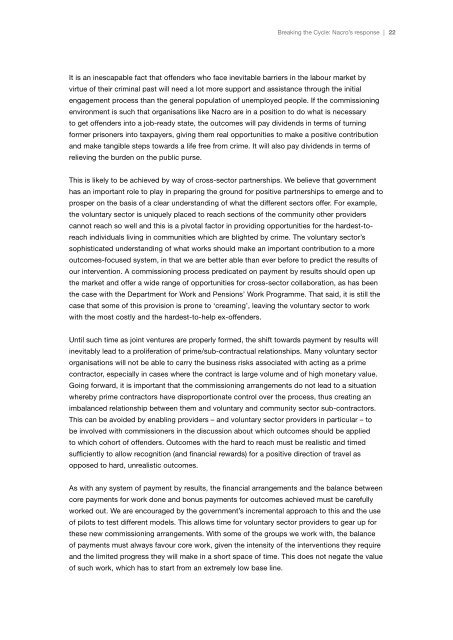Nacro's response to Breaking the Cycle Green Paper
Nacro's response to Breaking the Cycle Green Paper
Nacro's response to Breaking the Cycle Green Paper
Create successful ePaper yourself
Turn your PDF publications into a flip-book with our unique Google optimized e-Paper software.
<strong>Breaking</strong> <strong>the</strong> <strong>Cycle</strong>: Nacro’s <strong>response</strong> | 22It is an inescapable fact that offenders who face inevitable barriers in <strong>the</strong> labour market byvirtue of <strong>the</strong>ir criminal past will need a lot more support and assistance through <strong>the</strong> initialengagement process than <strong>the</strong> general population of unemployed people. If <strong>the</strong> commissioningenvironment is such that organisations like Nacro are in a position <strong>to</strong> do what is necessary<strong>to</strong> get offenders in<strong>to</strong> a job-ready state, <strong>the</strong> outcomes will pay dividends in terms of turningformer prisoners in<strong>to</strong> taxpayers, giving <strong>the</strong>m real opportunities <strong>to</strong> make a positive contributionand make tangible steps <strong>to</strong>wards a life free from crime. It will also pay dividends in terms ofrelieving <strong>the</strong> burden on <strong>the</strong> public purse.This is likely <strong>to</strong> be achieved by way of cross-sec<strong>to</strong>r partnerships. We believe that governmenthas an important role <strong>to</strong> play in preparing <strong>the</strong> ground for positive partnerships <strong>to</strong> emerge and <strong>to</strong>prosper on <strong>the</strong> basis of a clear understanding of what <strong>the</strong> different sec<strong>to</strong>rs offer. For example,<strong>the</strong> voluntary sec<strong>to</strong>r is uniquely placed <strong>to</strong> reach sections of <strong>the</strong> community o<strong>the</strong>r providerscannot reach so well and this is a pivotal fac<strong>to</strong>r in providing opportunities for <strong>the</strong> hardest-<strong>to</strong>reachindividuals living in communities which are blighted by crime. The voluntary sec<strong>to</strong>r’ssophisticated understanding of what works should make an important contribution <strong>to</strong> a moreoutcomes-focused system, in that we are better able than ever before <strong>to</strong> predict <strong>the</strong> results ofour intervention. A commissioning process predicated on payment by results should open up<strong>the</strong> market and offer a wide range of opportunities for cross-sec<strong>to</strong>r collaboration, as has been<strong>the</strong> case with <strong>the</strong> Department for Work and Pensions’ Work Programme. That said, it is still <strong>the</strong>case that some of this provision is prone <strong>to</strong> ‘creaming’, leaving <strong>the</strong> voluntary sec<strong>to</strong>r <strong>to</strong> workwith <strong>the</strong> most costly and <strong>the</strong> hardest-<strong>to</strong>-help ex-offenders.Until such time as joint ventures are properly formed, <strong>the</strong> shift <strong>to</strong>wards payment by results willinevitably lead <strong>to</strong> a proliferation of prime/sub-contractual relationships. Many voluntary sec<strong>to</strong>rorganisations will not be able <strong>to</strong> carry <strong>the</strong> business risks associated with acting as a primecontrac<strong>to</strong>r, especially in cases where <strong>the</strong> contract is large volume and of high monetary value.Going forward, it is important that <strong>the</strong> commissioning arrangements do not lead <strong>to</strong> a situationwhereby prime contrac<strong>to</strong>rs have disproportionate control over <strong>the</strong> process, thus creating animbalanced relationship between <strong>the</strong>m and voluntary and community sec<strong>to</strong>r sub-contrac<strong>to</strong>rs.This can be avoided by enabling providers – and voluntary sec<strong>to</strong>r providers in particular – <strong>to</strong>be involved with commissioners in <strong>the</strong> discussion about which outcomes should be applied<strong>to</strong> which cohort of offenders. Outcomes with <strong>the</strong> hard <strong>to</strong> reach must be realistic and timedsufficiently <strong>to</strong> allow recognition (and financial rewards) for a positive direction of travel asopposed <strong>to</strong> hard, unrealistic outcomes.As with any system of payment by results, <strong>the</strong> financial arrangements and <strong>the</strong> balance betweencore payments for work done and bonus payments for outcomes achieved must be carefullyworked out. We are encouraged by <strong>the</strong> government’s incremental approach <strong>to</strong> this and <strong>the</strong> useof pilots <strong>to</strong> test different models. This allows time for voluntary sec<strong>to</strong>r providers <strong>to</strong> gear up for<strong>the</strong>se new commissioning arrangements. With some of <strong>the</strong> groups we work with, <strong>the</strong> balanceof payments must always favour core work, given <strong>the</strong> intensity of <strong>the</strong> interventions <strong>the</strong>y requireand <strong>the</strong> limited progress <strong>the</strong>y will make in a short space of time. This does not negate <strong>the</strong> valueof such work, which has <strong>to</strong> start from an extremely low base line.
















